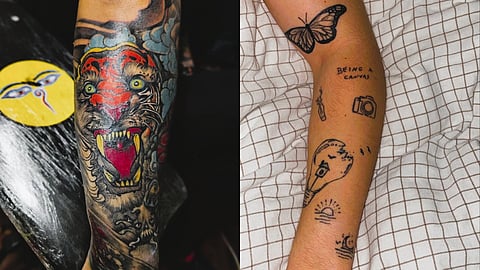
- HOMEGROWN WORLD
- #HGCREATORS
- #HGEXPLORE
- #HGVOICES
- #HGSHOP
- CAREERS
- ABOUT US
- CONTACT US

Tattoo culture, akin to an ever-shifting art gallery, is shaped by the currents of zeitgeists. Preferences in this dynamic realm metamorphose in sync with societal shifts, reflecting the spirit of the times. From the rebellious symbols of yesteryears to today's preference for minimalist, abstract, and hyper-realistic designs, tattoos have become a living canvas that mirrors contemporary attitudes. The acceptance of tattoos has also evolved from countercultural rebellion to a form of mainstream self-expression, intertwining personal narratives with a visual language that is embedded in our skin.
The current hot topic in the subculture seems to be the sleeve vs patchwork debate. Sleeve tattoos present a holistic concept, covering a substantial portion of the body, typically the arm or leg, developed gradually over multiple sessions. With its cohesive design, it encapsulates a narrative or theme that resonates deeply with the individual, reflecting personal beliefs and experiences. In contrast, patchwork tattoos involve acquiring separate pieces over time, serving as snapshots of different life moments. These distinct tattoos can eventually converge into a unified sleeve or form a curated collection of body art.
This dichotomy has bloomed into two contrasting schools of thought online. On one end, individuals craft intricately designed tattoos alongside the tattoo artists weaving profound personal narratives into the ink that serves as a meaningful symbol. On the opposite end of the spectrum is absolute irony, maybe even satire where people embrace the appeal of meaninglessness in their tattoo choices. For them, the permanence of the ink becomes an avenue for whimsical, humorous, or even absurd designs, creating a visual dialogue that challenges the traditional reverrence associated with tattoo art that, to them, seems both obnoxious and self-indulgent. Both of these outlooks stem directly with one's core identity and values expressed through either sincerety or absurdity.
"Individual expression is paramount in tattooing, and as Indians increasingly embrace a more globalized and interconnected world, their tattoos often become a unique blend of personal stories, cultural symbols, and global influences. The desire to express one's identity through body art has led to a diversification of tattoo styles, ranging from traditional motifs rooted in Indian culture to contemporary designs influenced by international trends", shares Mumbai-based tattoo artist Letitia Mendes. "The openness to self-expression has played a significant role in shaping tattoo trends. As societal attitudes become more accepting, people feel empowered to use tattoos as a means to convey their individuality, breaking away from traditional norms."
Sleeve and patchwork approaches are also shaped by how personal one wants a tattoo to be. Artist Ishana Aggarwal says, "Tattoos have graduated from just some very specifically meaningful designs to art as self-expression. We are straying further from the concept of intense meaning and concept and more finding the functionality in beauty, aesthetic, and art in itself. A good example of this would be flash sheets put out by various artists with wildly unique styles and inspirations. These are a set of designs not in relation to any one client but anyone who relates to these art pieces can book it and have it on their bodies forever. From what I’ve seen its become less about filling up your body with your own vision but more about almost becoming an art gallery for your favourite tattoo artists and appreciating every style."
Tattoos have become just another form of visual art encapsulating the spirit of the era in which they are etched, intertwined with the societal narrative. They are not merely expressions of personal style, but mirrors reflecting the prevailing sensibilities, cultural narratives and diverse identities. As both a form of self-expression and cultural preservation, tattoos transcend mere body art, becoming potent symbols that represent different communities and outlooks. Across the globe, tattoos weave stories of resilience, rebellion, and identity, forever capturing the essence of our shared human experience, ensuring they remain echoes of the times we inhabit.
